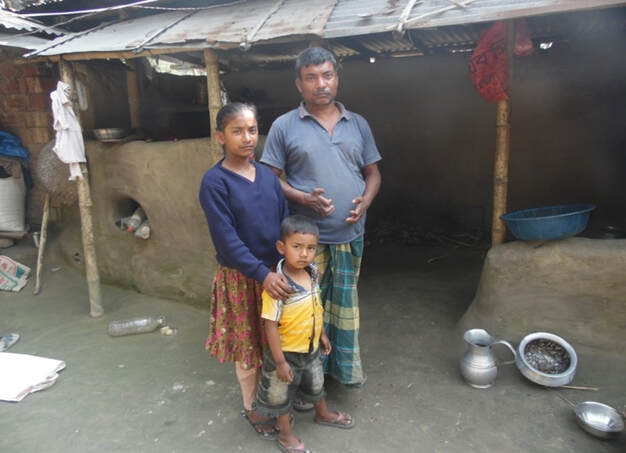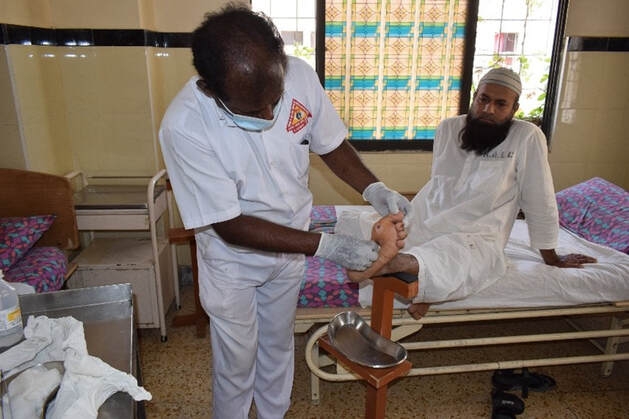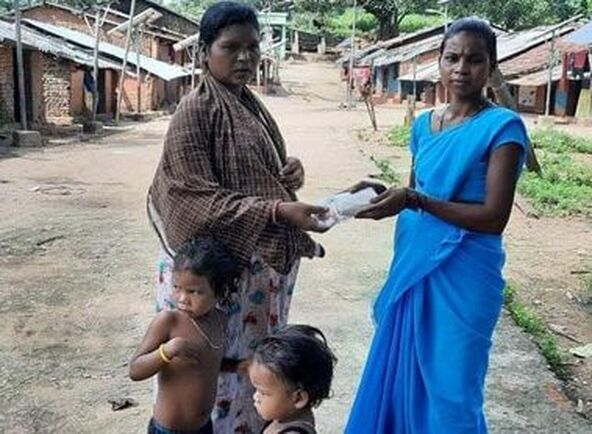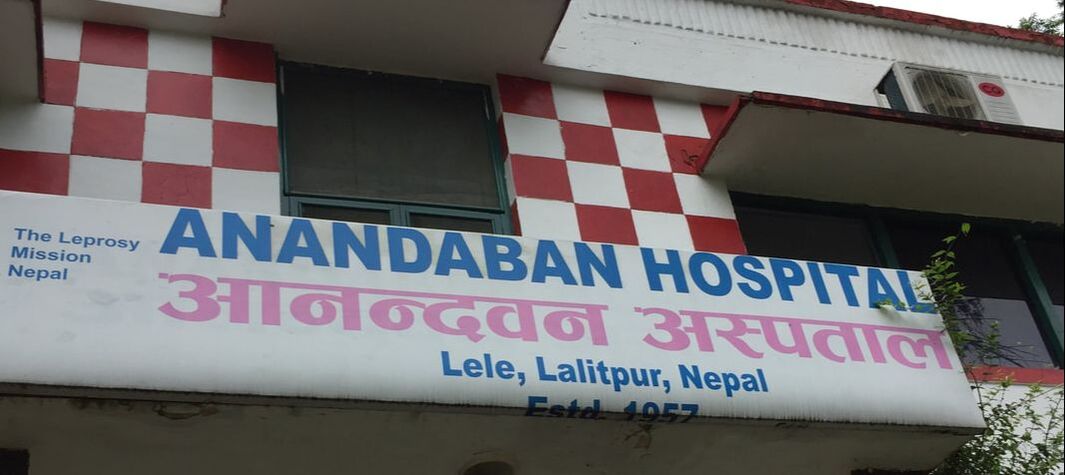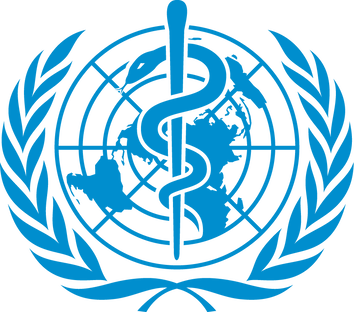PRESS RELEASE
Date: 8 September 2021
Date: 8 September 2021
SFLG celebrates its 125th year and launches a pioneering new programme -
Six new projects will actively find and treat people with leprosy and prevent disability
Six new projects will actively find and treat people with leprosy and prevent disability
London, UK: St Francis Leprosy Guild is delighted to announce that for the first time in its 125-year history, it is partnering with six other leprosy organisations in six new projects that will actively find and treat people with leprosy. This pioneering proactive approach means that the spread of leprosy can be stopped and the disability caused by the undetected disease, can be prevented.
SFLG’s TRACE operating strategy is putting an emphasis on active case-finding (ACF); early detection of leprosy followed by treatment with multidrug therapy reflecting new global approaches in the ongoing fight against leprosy.
SFLG considered 52 different projects for ACF and finally selected six "winners" with new and current partners as follows: ALERT-INDIA (India), Bombay Leprosy Project (India), Dhanjuri Leprosy Centre (Bangladesh), Marie Adelaide Leprosy Centre (Pakistan), New Hope Rural Leprosy Trust (India), Anandaban Leprosy Hospital, TLM Nepal (Nepal).
SFLG’s TRACE operating strategy is putting an emphasis on active case-finding (ACF); early detection of leprosy followed by treatment with multidrug therapy reflecting new global approaches in the ongoing fight against leprosy.
SFLG considered 52 different projects for ACF and finally selected six "winners" with new and current partners as follows: ALERT-INDIA (India), Bombay Leprosy Project (India), Dhanjuri Leprosy Centre (Bangladesh), Marie Adelaide Leprosy Centre (Pakistan), New Hope Rural Leprosy Trust (India), Anandaban Leprosy Hospital, TLM Nepal (Nepal).
ALERT-INDIA (Association for Leprosy Education), founded in 1978, is committed to improve the health and social status of people affected by leprosy and other communicable diseases with a special focus on vulnerable groups such as tribal, women, children and disabled. The project with SFLG will identify people affected by leprosy, treat, cure, care, prevent disability and the spread of infection. The project will focus on the neglected tribal and rural leprosy endemic geographies of Palghar district of Maharashtra which has high incidences of leprosy transmission, disability and child leprosy cases.
Bombay Leprosy Project (India) is an NGO founded by the eminent leprologist, Dr R Ganapati, who transformed leprosy work from a closed institutionalised approach to a widespread community-based intervention. The project with SFLG will increase awareness of leprosy and COVID-19 in the Dharavi slums of Mumbai and encourage active community life. This project will be achieved by training and engaging local community volunteers who will conduct door-to-door awareness campaigns.
Dhanjuri Leprosy Centre (Bangladesh) known as DLC, operates in the Dinajpur district in northern Bangladesh. DLC identifies and treats leprosy in 13 clinics across the region, provides treatment for local villages and carries out a range of outreach work to detect new cases. A longstanding partner of SFLG's, the project will provide leprosy treatment for local villages and will carry out a range of outreach work to detect new cases.
Read more about how DLC supports people with leprosy
Read more about how DLC supports people with leprosy
Marie Adelaide Leprosy Centre (Pakistan) known as MALC, has been working in Pakistan for over 60 years in Sindh, Balochistan, Khyber Pakhtunkhwa, Azad Kashmir and Gilgit-Baltistan. In Karachi, MALC runs its own 64 bed hospital and operates 10 sub-centres. MALC has worked with SFLG for the past 15 years. The overall goal of the joint project is to reduce the spread of leprosy, especially multibacillary cases, in the high endemic areas of Landhi Korangi and Maskan-e-Rahat, through early diagnosis and treatment and awareness raising.
Read more about how MALC supports people with leprosy
Read more about how MALC supports people with leprosy
New Hope Rural Leprosy Trust (India) is an NGO founded and run by the acclaimed leprosy campaigner, Eliazar T Rose. The NGO is based in the Muniguda District of Odisha where it treats over 2,500 patients a month. A long-term partner of SFLG's, this ambitious project will check the entire 79,000+ population of Muniguda for leprosy. Over the three year project term, all those who are newly diagnosed with leprosy, will be reported to the government to be acknowledged as patients and treated by MDT. The project will also establish those affected by leprosy who have been treated over the last eight years and check their contacts for the disease. New Hope seeks to change the status of leprosy from a stigmatised disease to one that is treatable and not to be feared.
Read more about how New Hope and ACF
Read more about how New Hope and ACF
Both New Hope and St Francis Leprosy Guild are on a new path and as partners and co-collaborators we believe the goals will be achieved, said Eliazar Rose, Founder of New Hope. Thank you for SFLG's faith in our ability to implement the leprosy elimination project. This approach is the first major step towards a new generation of people in a community without the fear of leprosy.
Anandaban Hospital (TLM Nepal) is an acclaimed leprosy hospital and rehabilitation centre with a world-renowned research institute. It is part of The Leprosy Mission. The project with SFLG will train 30 community health volunteers to find hidden cases of leprosy in the high-risk area of Nepal’s Province 2, where almost half of all new cases of leprosy are detected in Nepal. There is an urgent need to escalate the detection of the disease so that people can be diagnosed early and receive the treatment they desperately need and to prevent disability. The volunteers will also carry out contact tracing and contacts not displaying symptoms will be given a single dose of rifampicin.
“There is an urgent need to escalate the detection of the disease so that people can be diagnosed early and receive the treatment they so desperately need and to prevent disability” said Anandaban Programme Leader, Dirgha Hitan
St Francis Leprosy Guild has been caring for people with leprosy for the past 125 years, said SFLG Chief Executive Officer, Clare McIntosh. Since its foundation we have provided nursing care for people with leprosy, treating patients and the disabilities caused by the disease. Now we are rising to a new challenge and a new strategic focus. Working with our partners, we will actively find people with leprosy, many of whom live in remote locations, and start the treatment immediately. Early diagnosis and treatment stops the transmission of leprosy and prevents lifelong disabilities from developing. An end to leprosy just might be in sight.
ACF is a key component of SFLG’s TRACE strategy. Leprosy is a contagious disease, passed from person to person. It can only be fully eradicated if everyone with leprosy can be found. SFLG's focus is on diagnosing and treating people as early as possible, before disabilities and deformities can evolve and before it can be passed on to others.
SFLG works with other leprosy organisations to carry out vital community outreach work, raising awareness of the disease, monitoring for early symptoms, and overseeing treatment. This type of work is key in rural and remote communities, where people can be many miles from medical facilities with no means of transport. As well as seeking out new cases, ACF also involves tracing the close contacts of leprosy patients, so that they can be screened for the disease, meaning the chain of infection can be broken.
Contact tracing has proven vital to slowing the spread of the disease, and routing out potential cases.
Read more about active case-finding.
SFLG works with other leprosy organisations to carry out vital community outreach work, raising awareness of the disease, monitoring for early symptoms, and overseeing treatment. This type of work is key in rural and remote communities, where people can be many miles from medical facilities with no means of transport. As well as seeking out new cases, ACF also involves tracing the close contacts of leprosy patients, so that they can be screened for the disease, meaning the chain of infection can be broken.
Contact tracing has proven vital to slowing the spread of the disease, and routing out potential cases.
Read more about active case-finding.
For more information or interviews please contact:
Clare McIntosh
Chief Executive Officer
St Francis Leprosy Guild
London W10 6EJ
Tel: +44 (0)7754 592240
Email: [email protected]
Twitter @StLeprosy
Facebook
Clare McIntosh
Chief Executive Officer
St Francis Leprosy Guild
London W10 6EJ
Tel: +44 (0)7754 592240
Email: [email protected]
Twitter @StLeprosy
About St Francis Leprosy Guild (SFLG)
SFLG is a UK-based, Catholic charity that is working towards a -leprosy-free world. We support the work of over 40 leprosy centres, clinics, hospitals, care homes and leprosy-related projects. We work in 14 countries worldwide in Africa, Asia and South America where leprosy is endemic.
About leprosy
1. What is leprosy?
Leprosy (also known as Hansen’s disease) is a complex, chronic neglected tropical disease caused by the Mycobacterium leprae bacterium. It affects the skin, the upper respiratory tract and peripheral nerves in the hands and feet, and the eyes. Leprosy can affect anyone, at any age, but it is linked to poverty, malnutrition, and genetic susceptibility.
Leprosy remains an important health problem in low and middle-income countries worldwide.
2. How is leprosy transmitted?
It is thought that leprosy is transmitted via droplets from the nose combined with prolonged, close contact with infected individuals.
3. How is leprosy diagnosed?
Leprosy is difficult to diagnose at its early stages, but it often presents as numb patches on the skin. Currently, the most reliable method to diagnose leprosy, is a slit-skin-smear test in the laboratory.
Leprosy may incubate for up to twenty years before presenting with any signs. If leprosy remains undiagnosed like this, the person affected may unwillingly transmit the disease throughout a community. However, within a short period of receiving multidrug therapy, a person affected by leprosy will no longer be infectious. If leprosy is diagnosed in its early stages, it can be treated readily, and it will not cause disabilities. Preventing disabilities from developing means people with leprosy are less likely to suffer from the stigma and discrimination that can destroy their livelihoods and entire lives.
4. How infectious is leprosy?
95% of most populations have a natural immunity to leprosy. The remaining 5% become vulnerable, mainly through poor nutrition, poor living conditions, lack of hygiene and a weakened immune system. Leprosy is not hereditary.
5. Why are people with leprosy often so disfigured?
People with leprosy lose all feeling in the affected areas and as a result, there is diminished awareness of harm from trauma or heat. Without treatment, the lack of sensation can lead to permanent damage to skin, nerves, limbs, and eyes. It can also lead to the development of reoccurring, lifelong, hard-to- treat ulcers.
6. Is there a cure? How is leprosy treated?
Leprosy can be cured using multidrug therapy (MDT), available at no cost to patients from the World Health Organization. If MDT is taken in the early stages of the disease, permanent damage to nerves is completely avoided.
7. How many are affected by leprosy in the world today?
The latest *WHO statistics reveal that in 2019 there were 202,185 new cases of leprosy diagnosed. Of concern and indicating ongoing transmission, the number of children newly detected was nearly 15,000.
These statistics do not account for those people who have leprosy with no symptoms or, who are not diagnosed and are unwittingly transmitting it to their communities. In addition, the statistics do not include those individuals who have been treated for leprosy, but whose disabilities, caused by leprosy need ongoing healthcare needs, or those who are subject to leprosy stigma and discrimination.
8. Which countries have leprosy, where is leprosy endemic?
*The WHO has identified 23 global priority countries for leprosy, where 95.9% of the global total of people detected with leprosy are found. The 23 countries are: Angola, Bangladesh, Brazil, Comoros, Cote Ivoire, DR Congo, Egypt, Ethiopia, India, Indonesia, Kiribati, Madagascar, Micronesia, Mozambique, Myanmar, Nepal, Nigeria, Philippines, South Sudan, Sri Lanka, Sudan, Somalia and Tanzania.
The highest number of people newly detected with leprosy in 2019 live in India with 114,451, followed by Brazil with 27,863 and Indonesia with 17,439.
*WHO Weekly epidemiological record, Global Leprosy Update 4 September 2020, 36, 2020, 95, 417-440
SFLG is a UK-based, Catholic charity that is working towards a -leprosy-free world. We support the work of over 40 leprosy centres, clinics, hospitals, care homes and leprosy-related projects. We work in 14 countries worldwide in Africa, Asia and South America where leprosy is endemic.
About leprosy
1. What is leprosy?
Leprosy (also known as Hansen’s disease) is a complex, chronic neglected tropical disease caused by the Mycobacterium leprae bacterium. It affects the skin, the upper respiratory tract and peripheral nerves in the hands and feet, and the eyes. Leprosy can affect anyone, at any age, but it is linked to poverty, malnutrition, and genetic susceptibility.
Leprosy remains an important health problem in low and middle-income countries worldwide.
2. How is leprosy transmitted?
It is thought that leprosy is transmitted via droplets from the nose combined with prolonged, close contact with infected individuals.
3. How is leprosy diagnosed?
Leprosy is difficult to diagnose at its early stages, but it often presents as numb patches on the skin. Currently, the most reliable method to diagnose leprosy, is a slit-skin-smear test in the laboratory.
Leprosy may incubate for up to twenty years before presenting with any signs. If leprosy remains undiagnosed like this, the person affected may unwillingly transmit the disease throughout a community. However, within a short period of receiving multidrug therapy, a person affected by leprosy will no longer be infectious. If leprosy is diagnosed in its early stages, it can be treated readily, and it will not cause disabilities. Preventing disabilities from developing means people with leprosy are less likely to suffer from the stigma and discrimination that can destroy their livelihoods and entire lives.
4. How infectious is leprosy?
95% of most populations have a natural immunity to leprosy. The remaining 5% become vulnerable, mainly through poor nutrition, poor living conditions, lack of hygiene and a weakened immune system. Leprosy is not hereditary.
5. Why are people with leprosy often so disfigured?
People with leprosy lose all feeling in the affected areas and as a result, there is diminished awareness of harm from trauma or heat. Without treatment, the lack of sensation can lead to permanent damage to skin, nerves, limbs, and eyes. It can also lead to the development of reoccurring, lifelong, hard-to- treat ulcers.
6. Is there a cure? How is leprosy treated?
Leprosy can be cured using multidrug therapy (MDT), available at no cost to patients from the World Health Organization. If MDT is taken in the early stages of the disease, permanent damage to nerves is completely avoided.
7. How many are affected by leprosy in the world today?
The latest *WHO statistics reveal that in 2019 there were 202,185 new cases of leprosy diagnosed. Of concern and indicating ongoing transmission, the number of children newly detected was nearly 15,000.
These statistics do not account for those people who have leprosy with no symptoms or, who are not diagnosed and are unwittingly transmitting it to their communities. In addition, the statistics do not include those individuals who have been treated for leprosy, but whose disabilities, caused by leprosy need ongoing healthcare needs, or those who are subject to leprosy stigma and discrimination.
8. Which countries have leprosy, where is leprosy endemic?
*The WHO has identified 23 global priority countries for leprosy, where 95.9% of the global total of people detected with leprosy are found. The 23 countries are: Angola, Bangladesh, Brazil, Comoros, Cote Ivoire, DR Congo, Egypt, Ethiopia, India, Indonesia, Kiribati, Madagascar, Micronesia, Mozambique, Myanmar, Nepal, Nigeria, Philippines, South Sudan, Sri Lanka, Sudan, Somalia and Tanzania.
The highest number of people newly detected with leprosy in 2019 live in India with 114,451, followed by Brazil with 27,863 and Indonesia with 17,439.
*WHO Weekly epidemiological record, Global Leprosy Update 4 September 2020, 36, 2020, 95, 417-440


